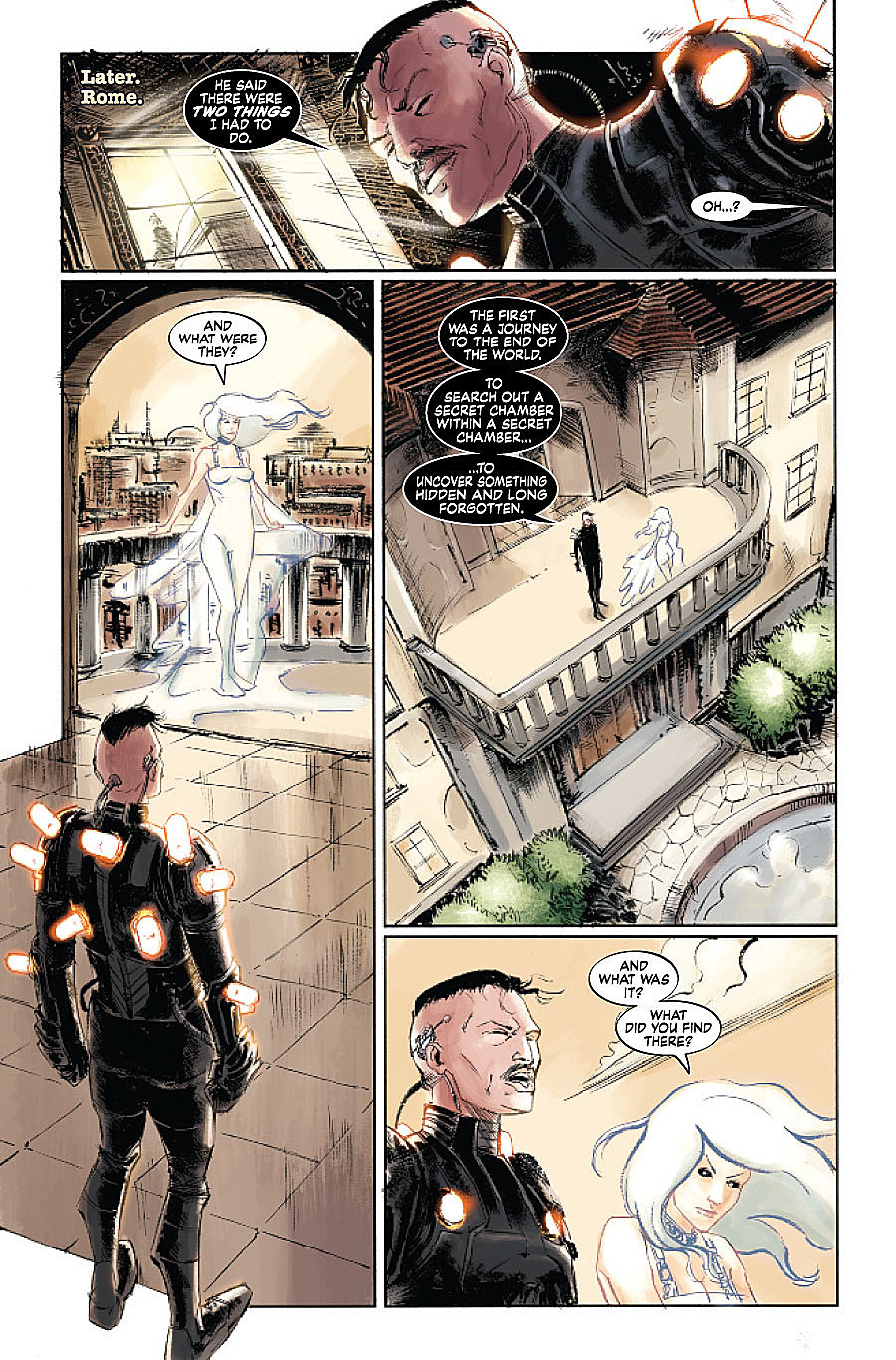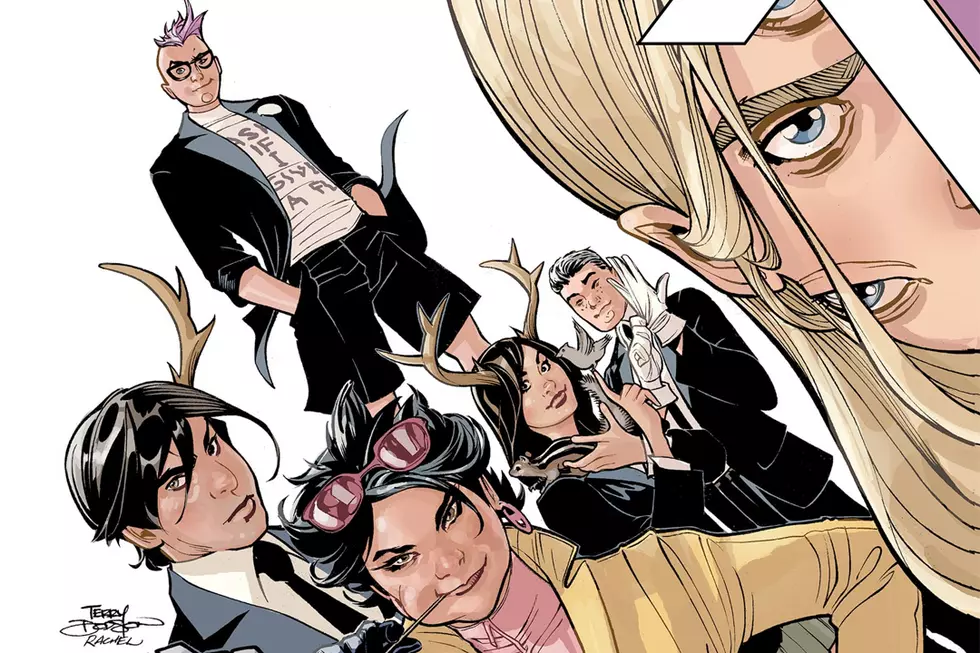![S.H.I.E.L.D. Architects of Forever: The World’s Secret History Revealed [Review]](http://townsquare.media/site/622/files/2011/04/shield-china.jpg?w=980&q=75)
S.H.I.E.L.D. Architects of Forever: The World’s Secret History Revealed [Review]

S.H.I.E.L.D., which releases its first six-issue hardcover collection this week, is a captivating tale of the secret history of the Marvel Universe, centered around a battle between believers in fate, believers in free will, and bystanders caught in between. For history buffs, it features cameos from some of the most notable artists and scientists to ever have lived, like Leonardo DaVinci and Isaac Newton. For die-hard Marvel fans, there are plenty of obvious and not so obvious guest appearances as well. And for those simply looking for a good comic, S.H.I.E.L.D.: Architects of Forever, written by Hickman and beautifully illustrated by Dustin Weaver with colors by Christina Strain, is a wonderful read that benefits greatly from being collected.

When Marvel readers hear the term "S.H.I.E.L.D," the first images that probably come to mind are Nick Fury, Dum-Dum Dugan, blue spandex with white stripes and high-tech helicarrier bases. But this book is the story of a S.H.I.E.L.D. that, so far at least, has no direct connection to that group. No eyepatches, no bowler hats, no cigars, intricate armor instead of spandex, massive ancient city under Rome instead of airships. This isn't your father's S.H.I.E.L.D. Well, all right, it sort of is, because the series' present day is the 1950s Marvel Universe. And in the case of Iron Man and Mr. Fantastic, this very much their father's S.H.I.E.L.D.
As the book opens, we see agents Howard Stark and Nathaniel Richards given the task of finding a special young man named Leonid and bringing him before the High Council of the Shield in the Immortal City a quarter mile beneath Rome. There, Leonid learns the secret history of S.H.I.E.L.D.: Founded by a man named Imhotep who saved the world from an alien invasion in Egypt in 2620 B.C., it has sought ought great men throughout history and tasked them with protecting humanity from threats known and unknown in order to guide it to its ultimate purpose. It counts among its number such men as Zhang Heng, Abu Musa JÄbir ibn HayyÄn, Galileo Galilei and Leonardo DaVinci.
Leonid has been brought to learn S.H.I.E.L.D.'s ways at a critical point in its history, as his father, a man encased in a suit of technology known as the Night Machine, has come to the Immortal City to bring it all down. When Night Machine and Agents Stark and Richards are caught up into a fight that pulls them through time, Leonid is left behind and finds himself in the middle of ideological battle between Leonardo DaVinci, a former S.H.I.E.L.D. master returned to the present day, and the current master of S.H.I.E.L.D., the immortal Isaac Newton.

Simply described in this manner, S.H.I.E.L.D can come off as a little absurd -- and I didn't even mention the absolutely gorgeous scenes where Galactus attacks Renaissance-era Rome -- but what makes the series great is the ideas Hickman builds the plot and characters around. The fight between Newton and DaVinci is one of fate against free-will. Each man rallies around S.H.I.E.L.D.'s battle cry of "This is not how the world ends," but it carries a different significance depending on the speaker.
For Newton, his eternal life has become an obsession with perfecting humanity's knowledge. Part of the knowledge is knowing how the world will someday end, and he feels it is in no way shameful or natural to follow the path he believes in to its logical conclusion. For DaVinci, it is a belief in the limitless potential of humanity to overcome any obstacle put in its path, to fight even against the destiny Newton believes in. And both men are so committed to their ideas that they risk destroying the very organization they helped build.

Hickman's many historical characters work not because he strives to make them as historically accurate as possible, but rather because he shapes them into such interesting characters on their own, with complex backgrounds and competing goals. Newton is an excellently realized villain created by a drive to get more power, more knowledge, no matter the price that needs to be paid. And yet he's in charge of a group with the most benevolent of stated goals, and he's fully capable of protecting the world from harm until its final fated hour. DaVinci is a nearly angelic, good-hearted man with complete faith in the ability of humanity to achieve any goal, and yet that complete faith can be a liability at times.
I won't go so far as to say that Hickman is doing this intentionally, nit it's curious to see the fight between the two sides as one between the standard superhero comic and the ones Hickman tends to write. Ordinary superheroes seem forever obsessed, like Newton, only with saving the world and protecting those in danger, but there's very little done to improve it and move it forward, because the status quo is god in continuity based superhero universes. But DaVinci's side has another vision that's a very different and compelling alternative, a world where the hero is not merely the protector but the man who improves the world on behalf of the next generation to inherit it. The same compelling alternative seen in the most optimistic of Hickman's creator-owned books, as well as in parts of his Fantastic Four run.

But the book's not merely about these two men. It goes beyond even the much larger and well-developed cast of figures, both historical and fictional and completely reenvisions history. The jumps forward and backward in time are accompanied by both strong and subtle changes in art styles and all look wonderful. The designs of the city, uniforms and technology of S.H.I.E.L.D. are intricate and astounding in their quality and variety.
The whole approach gives the impression of a setting that is at once unlike anything seen in the Marvel Universe before and yet not at all out of place within its confines. It takes the real-life narrative of history as a constant struggle to reshape the world and effectively recontextualizes it into a place where that world needs to be saved from a giant planet eating purple space man in between the moments when the era's great thinkers are charting the stars and discovering calculus.

I won't go so far as to say the book's perfect. Even in Hickman's previous books for Image there was a tendency for his resolutions to ask questions rather than supply answers. And those were self-contained works. Architects of Forever is only the first volume of a larger story, and anyone looking for any sort of resolution wrapping up your reading experience here isn't going to find it. With the series releasing issues on a bi-monthly basis, it'll be a long wait for volume 2 to get here. Plus, given that this is treading on a lot of sacred ground for both history historians and Marvel historians, you're probably going to find something to nitpick over. In my case it was Hickman chucking in the 8th century Middle East under the headline "the Darkest of Ages," but you'll find your own.
The point is, though, that I had to start nitpicking to find problems with S.H.I.E.L.D. This is one of my favorite books Marvel is currently releasing. It's accessible to new readers. If you've been a fan of Hickman's other works, like Transhuman, The Nightly News, Red Mass for Mars or Pax Romana, but haven't followed him over to Marvel, then this is a good opportunity to give his non-creator owned work a chance. If you're a dedicated Marvel reader but wanted to stick to his monthly series with more familiar characters like Secret Warriors and Fantastic Four, take this chance to catch up on more of his work.
S.H.I.E.L.D. is so densely packed with information, and comes out so infrequently, that even if you bought the singles, you'd be surprised how much you might have missed the first time around. And if you haven't yet, make sure to check out S.H.I.E.L.D. issue Infinity, a collection of four short stories from different eras in the series' history released last week.
Preview: S.H.I.E.L.D. #Infinity








More From ComicsAlliance






![Bebop And Rocksteady Journey To The Distant Past Of The Year 2000 (And Also Dinosaur Times) In ‘Bebop And Rocksteady Destroy Everything’ #2 [Preview]](http://townsquare.media/site/622/files/2016/06/Bebop00.jpg?w=980&q=75)


